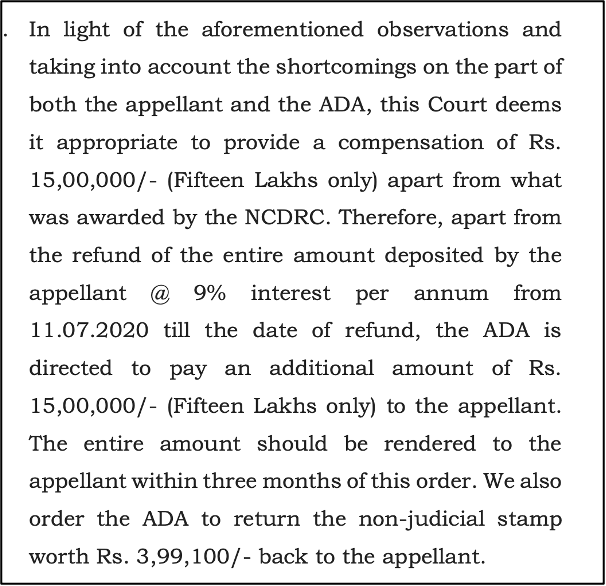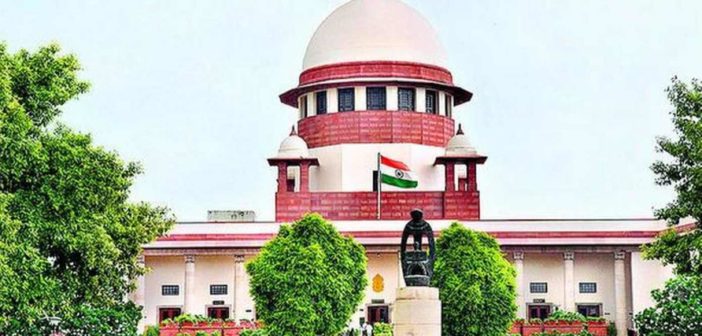In this edition of the Court Judgements review, we look at the SC’s judgments that resignation is not effective until accepted and communicated to the employee, that dowry demand hasn’t been proven, so the death cannot be classified as a dowry death, that alleged involvement in crime isn’t a valid reason to demolish legally constructed property, among others.
SC: Resignation is not effective until accepted and communicated to the employee
The appellant in the case, S.D. Manohara vs. Konkan Railway Corporation Limited & Others, was a railways employee with 13 years of service and had submitted his resignation in December 2013, effective after one month. The key issue before the Supreme Court was whether the appellant withdrew his resignation before it was accepted by the employer. The railways claimed the resignation was accepted on 15 April 2014, effective from 07 April 2014, and that the appellant’s request to withdraw the resignation on 26 May 2014 was rejected on 23 June 2014. The appellant argued that he never received the acceptance letter and continued to work, reporting on 19 June 2014. He also relied on letters from his wife and a directive from the respondent to report to duty.
The Supreme Court’s bench comprising Justices PS Narasimha and Pankaj Mithal examined the critical letters and communications. The letter dated 15 April 2014, which the respondent claimed accepted the resignation, was deemed an internal communication with no clear evidence of service to the appellant. The appellant’s continuous engagement and the respondent’s directive to report to duty on 10 May 2014 suggested the resignation was not finalized. The court found that the appellant’s withdrawal of the resignation on 26 May 2014 was valid and occurred before the acceptance.
The Supreme Court allowed the employee’s appeal. They ordered the employee’s reinstatement within 30 days, with 50% back pay for the period since his dismissal. This period would be counted towards pensionary benefits. The Court emphasized that this decision was specific to the case’s facts and not intended to establish a legal precedent.
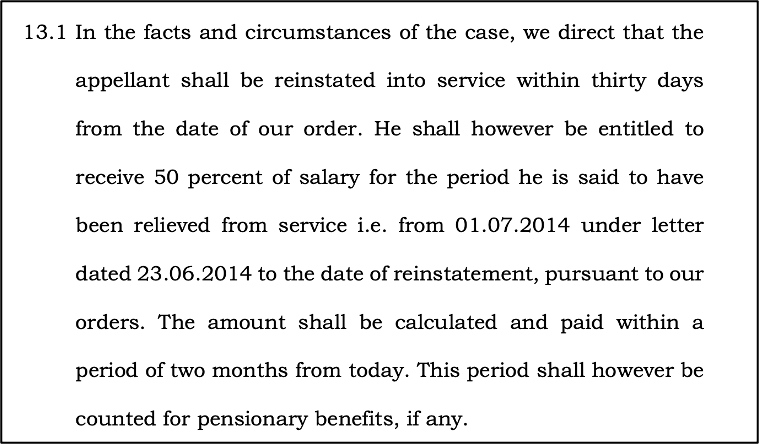
SC: Dowry demand hasn’t been proven, so the death cannot be classified as a dowry death
The case, Chabi Karmakar & Others. vs. the State of West Bengal involves the death of Sonali Karmakar, who committed suicide by hanging herself in her matrimonial home in May 2006. An FIR was lodged by her brother, alleging that the deceased was harassed by her in-laws for dowry. The case was registered under Sections 498A, 304B, and 34 of the Indian Penal Code (IPC). Her husband, Samir Karmarkar (appellant 2), his sister (appellant 1), and mother (appellant 3) were convicted under various sections of the IPC for dowry-related harassment and abetment of suicide. The trial court sentenced them to life imprisonment, and the High Court upheld the conviction and sentence. An appeal was filed before the Supreme Court. Appellant 3 passed away during the appeal, and the case against her abated.
Supreme Court bench comprising Justices Sudhanshu Dhulia and JB Pardiwala observed that certain facts were proven, including Sonali’s death within seven years of marriage, her suicide in the matrimonial home, harassment by her husband, and marital discord. However, it found insufficient evidence to convict appellant 1, emphasizing the lack of credible evidence connecting her to the crime. Regarding appellant no. 2, the Court noted that while there was evidence of cruelty and harassment, the prosecution failed to establish a direct link between the demands and the suicide, as required for a conviction under Section 304B of IPC.
The Court referred to previous judgments to interpret the ingredients of Section 304B of IPC and set aside the conviction of appellant 2 under Section 304B of IPC (dowry death) due to insufficient evidence linking the dowry demands to suicide. However, the Court convicted Appellant 2 under Section 306 (abetment of suicide) and Section 498A (cruelty) of IPC, sentencing him to three years of rigorous imprisonment and a fine for each offence, to be served concurrently. Appellant 1 was acquitted of all charges.
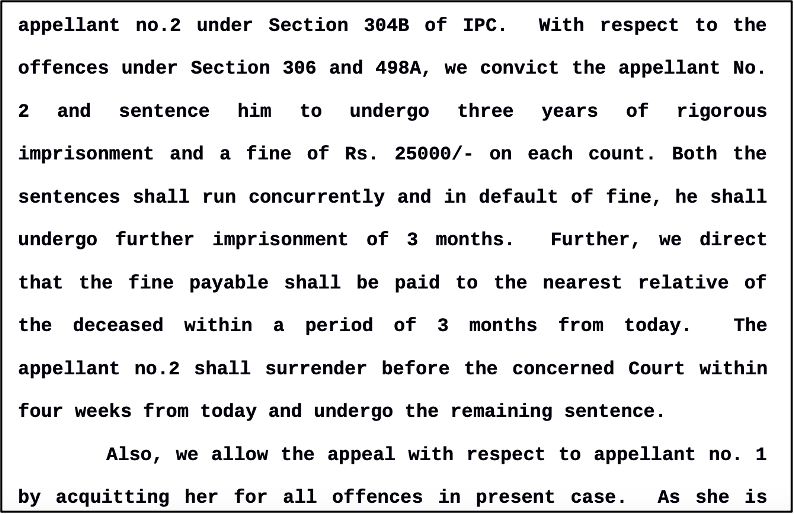
SC: Alleged involvement in crime isn’t a valid reason to demolish legally constructed property
In the case, Javedali Mahebubmiya Saiyed vs. State of Gujarat & Another, the petitioner is a co-owner of land with existing residential houses, facing demolition threats from municipal authorities following an FIR against a family member. The petitioner’s family has resided there for generations. A complaint has already been filed with the Deputy SP highlighting the situation and asserting that legal action should be taken against the accused individual, but the family home should not be demolished. The petitioner argued that the threat of demolition was unlawful and cited a potential pan-India action by the court against such practices.
The Supreme Court Bench of Justice Hrishikesh Roy, Justice Sudhanshu Dhulia, and Justice SVN Bhatti observed that in a country governed by the rule of law, actions against a single family member shouldn’t implicate other family members or their legally constructed residence. Alleged criminal involvement does not justify demolition, especially when the alleged crime hasn’t been proven in court. The court expressed concern over such demolition threats, viewing them as potentially undermining the rule of law. The court issued notice, returnable in four weeks, and directed that the status quo be maintained regarding the petitioner’s property. All concerned parties were instructed to ensure no action is taken to demolish the petitioner’s legally constructed and occupied home until the matter is resolved.
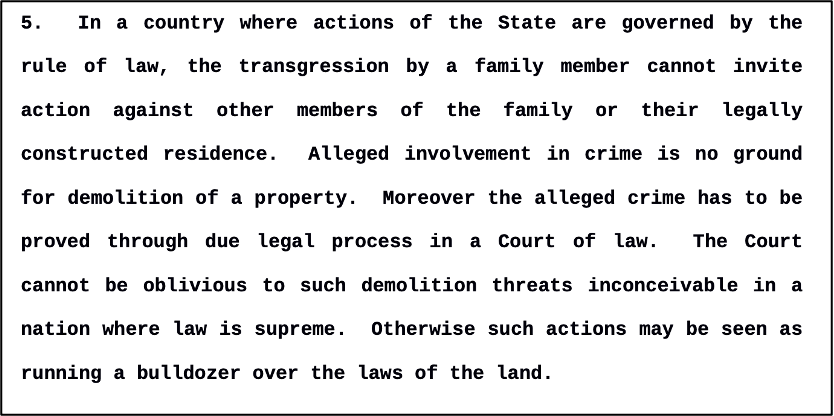
MP HC: Well-qualified spouses shouldn’t be idle and claim maintenance from their husband
In the case, Shikha vs. Avaneesh Mahodaya before the Madhya Pradesh High Court, the wife filed an application under Section 125 of the Cr.P.C. before the Family Court in Indore, seeking maintenance from her husband. They were married in November 2023, and she alleged that her husband physically and mentally harassed her, causing her to suffer a miscarriage and compelling her to stay at her maternal home. The husband works as a Vice President at Citi Bank in Dubai, earning 1,60,000 Dirhams annually, plus additional income. The wife claimed she needed Rs. 60,000 per month to maintain her standard of living. The husband denied the allegations, stating the wife is well-educated, employed, and has her own sources of income. The Family Court granted the wife Rs. 60,000 per month in maintenance.
Justice Prem Narayan Singh considered the evidence and arguments presented by both parties. The wife’s statements indicated she was left by her husband and was entitled to maintenance. The husband’s claim of unemployment in Dubai was not convincing. The court noted the husband’s substantial income and the wife’s ability to earn, given her education and previous employment. The court cited various Supreme Court judgments, emphasizing that the maintenance amount should be reasonable and realistic, ensuring the wife can live comfortably without becoming a burden on the husband.
The wife’s revision petition for increased maintenance was dismissed. The husband’s petition was partly allowed, reducing the monthly maintenance from Rs. 60,000 to Rs. 40,000. The remaining aspects of the Family Court’s order remained unchanged.
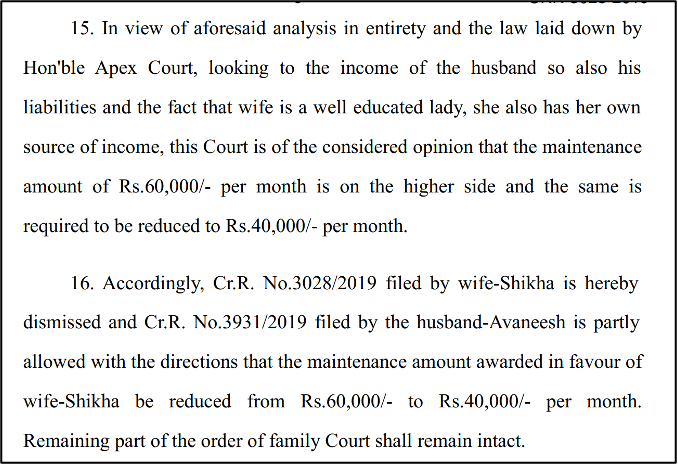
SC: Buyer should be compensated for giving flat possession without completion or firefighting certificates
In the case, Dharmendra Sharma vs. Agra Development Authority, the appellant is a flat buyer and challenged an NCDRC order that directed a refund of the deposit with interest from the complaint in 2020 but denied compensation and a refund for stamp duty. The developer (ADA) offered possession in 2014 without a completion certificate or fire clearance, while the buyer delayed full payment until 2019, despite repeated reminders. The developer also appealed the NCDRC order, citing limitation issues due to the payment delay and disputing NCDRC’s jurisdiction as the deposit was less than Rs. 1 crore.
The Supreme Court bench of Justice Vikram Nath and Justice Prasanna B Varale noted deficiencies on both sides: the buyer’s delayed payment and the developer’s offer of possession without mandatory certificates. The Court deemed the developer’s offer of possession invalid due to the missing documents. Regarding the developer’s appeals, the Court rejected the limitation argument, stating the developer’s acceptance of late payment restarted the limitation period. It also affirmed NCDRC’s jurisdiction, as the buyer’s claim exceeded Rs. 1 crore when including compensation for mental agony and other losses.
The Supreme Court modified the NCDRC order. It upheld the deposit refund with 9% interest but from the deposit date, not the complaint date. It also ordered the refund of stamp duty. Crucially, the Court awarded the buyer Rs. 15 lakhs as compensation for the developer’s deficiency in service, over and above the refunded amounts. The developer’s appeal was dismissed. All payments were to be made within three months.
